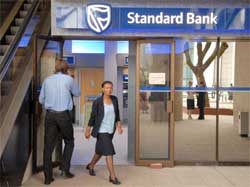
Related

On-the-road fees in vehicle financing: Impact of SCA ruling on installment sale agreements
Armand Swart 13 Oct 2025




Top stories






More news


Marketing & Media
Ads are coming to AI. Does that really have to be such a bad thing?














The case taken to court by Eastern Cape teacher Xoliswa Tshatshu late last month is one of at least 20 similar cases on reverse mortgage schemes before the courts.
For Tshatshu‚ the case will determine whether she can keep her house. But it also raises questions about how far the banks should go in investigating the creditworthiness of their customers.
In a separate case‚ Standard Bank said a scheme by the same company that swindled Tshatshu‚ was fraudulent. But the bank said it had had no reason to suspect this‚ and in good faith it acted on the basis that it was a normal bond application.
But Tshatshu said that under the National Credit Act‚ banks must assess the creditworthiness of customers. If they did not‚ a credit agreement was considered "reckless" and could be set aside by a court.
In a reverse mortgage scheme‚ companies offer loans to people who have been blacklisted. The only requirement is that they own a property. But instead of using the person's house to secure the loan‚ the scheme involves actually transferring‚ unbeknown to the original owner‚ title of the house to the company‚ which then takes out a bond with established credit providers such as Standard Bank - but for a considerably higher amount than the loan itself‚ which the debtor has to pay off.
Already the high court in Bloemfontein has found an identical scheme‚ involving a different bank‚ to be fraudulent and set aside the property transfer. Signs are that these types of schemes are widespread. The Bloemfontein case referred to a company called Brusson Finance.
In Tshatshu's case‚ she thought she would be paying back R100‚000 but in reality would have had to pay back R600‚000 before her property would be transferred back to her.
In her court papers‚ Tshatshu said one of the companies involved‚ Asset Management Specialists (AMS)‚ was said to have induced more than 150 people into such schemes and that 35 of these involved Standard Bank.
Tshatshu said: "When I took the loan‚ at no point was I told that I was selling my house. In hindsight I believe that they deliberately tried to conceal this from me."
Tshatshu said the companies she had originally contracted with‚ Dream World Investments and AMS‚ are in liquidation or have been deregistered. She was then contacted by the liquidators of Dream World‚ who told her that she could buy back the property at its current market value‚ which she could not afford.
Tshatshu - assisted by the Legal Resources Centre - said in her affidavit that had Standard Bank investigated Dream World and AMS as it should have‚ this would have revealed the fraudulent nature of the Dream World and AMS operations.
"Unless Standard Bank could explain‚ the court should infer that the bank acted recklessly in approving the loan‚" she said.
Standard Bank has yet to file its answering court papers and spokesman Ross Linstrom said the bank would not comment on continuing litigation.

For more than two decades, I-Net Bridge has been one of South Africa’s preferred electronic providers of innovative solutions, data of the highest calibre, reliable platforms and excellent supporting systems. Our products include workstations, web applications and data feeds packaged with in-depth news and powerful analytical tools empowering clients to make meaningful decisions.
We pride ourselves on our wide variety of in-house skills, encompassing multiple platforms and applications. These skills enable us to not only function as a first class facility, but also design, implement and support all our client needs at a level that confirms I-Net Bridge a leader in its field.
Go to: http://www.inet.co.za